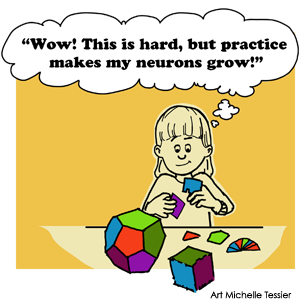What will your mindset be going into 2017? We are in a time of change and uncertainty, which presents us with an urgent opportunity to approach the future with a commitment toward progress and growth.
There is compelling new evidence that an understanding of the human brain’s unlimited capacity for learning is a powerful lens through which to view our days ahead. It’s been almost a decade since Carol Dweck first provided evidence that teaching students about the brain’s plasticity confers a “growth-oriented” learning mindset and has a profound effect on motivation and effort. (For more details see this TedX by Dweck herself).
The most recent work from her lab looks at data from an entire population of 10th graders in the country of Chile. Dweck combined socioeconomic data collected from parents, and standardized test scores in English and Math, with a mindset survey. Two major findings with tremendous statistical power came from this work.
Finding 1) Students with the growth mindset perform better than those with a fixed mindset when controlling for family income. This means if you take two students who have the same income level, one with a growth mindset and one with a fixed mindset, the student with the growth mindset is much more likely to have higher scores in both math and English.
Finding 2) The growth mindset has a stronger correlation with student achievement for students of lesser means. Students with the growth mindset consistently score better across all income levels. However, the performance gap between those with a growth versus fixed mindset is significantly larger for students with lower family income than it is for students with high family income. Mindset matters more for students of lower socioeconomic status.
As educators who might be fretting what’s to come for all of our students, we can resolve to committing to the growth mindset with fidelity in the new year as a means of enhancing equity. Here are two suggestions for how:
- Analyze your own classroom approach to failure. The best assessment of a teacher’s mindset is their method for handling students’ errors. Is a student’s mistake an opportunity for revision and learning based on your targeted feedback, or is it a pock mark on their grade?
- Build connection and trust. Building relationships with your students, and then giving them explicit, high expectations feedback reinforces that your approach to failure is to use it as an opportunity for learning. It also lets students know that in this classroom their perseverance matters more than any category they may be used to falling into.
As a company we spend lots of time talking about the biology of learning, specifically helping educators to build resilient and growth-oriented learning communities. Contact us for tailored educator, parent or student programming that will jump-start a new year with growth mindset.

